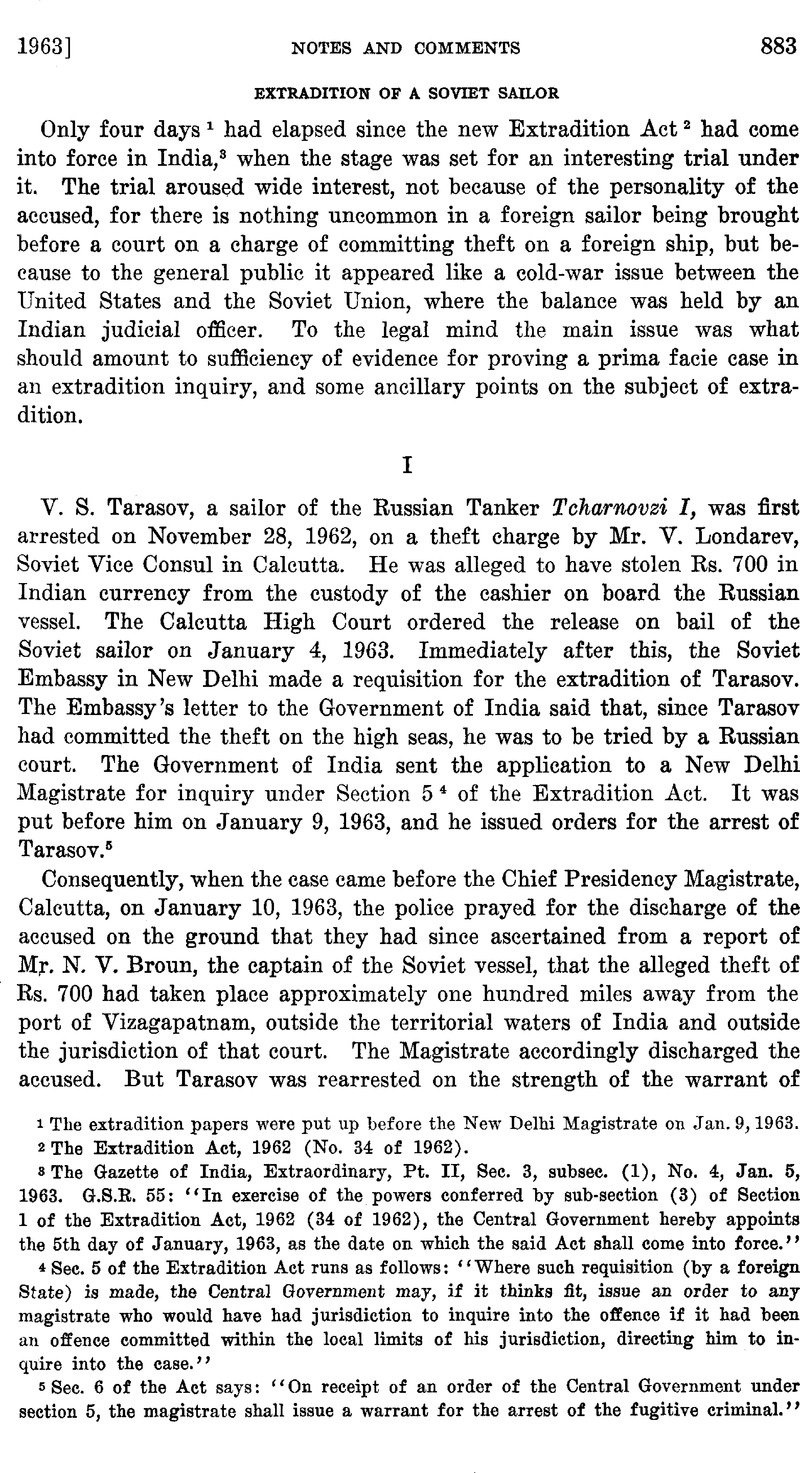Published online by Cambridge University Press: 28 March 2017

1 The extradition papers were put up before the New Delhi Magistrate on Jan. 9,1963
2 The Extradition Act, 1962 (No. 34 of 1962).
3 The Gazette of India, Extraordinary, Pt. II, Sec. 3, subsec. (1), No. 4, Jan. 5, 1963. G.S.R. 55: “ I n exercise of the powers conferred by sub-section (3) of Section 1 of the Extradition Act, 1962 (34 of 1962), the Central Government hereby appoints the 5th day of January, 1963, as the date on which the said Act shall come into force. ”
4 Sec. 5 of the Extradition Act runs as follows: “ Where such requisition (by a foreign State) is made, the Central Government may, if it thinks fit, issue an order to any magistrate who would have had jurisdiction to inquire into the offence if it had been an offence committed within the local limits of his jurisdiction, directing him to inquire into the case.”
5 Sec. 6 of the Act says: “On receipt of an order of the Central Government under section 5, the magistrate shall issue a warrant for the arrest of the fugitive criminal.“
6 See. 7(1) : “When the fugitive criminal appears or is brought before the magistrate, the magistrate shall inquire into the case in the same manner and shall have the same jurisdiction and powers as nearly as may be, as if the case were one triable by a court of session or High Court.”
7 Art. 56 of the Ukrainian Criminal Procedure Code lists a flight abroad or the refusal to return from abroad to the U.S.S.E. as treason punishable with ten to fifteen years' imprisonment, or confiscation of property, or with death or both death and confiscation of property.
8 The Hindustan Times, March 30, 1963.
9 Ee Candino De Pepe, 1956 Int. Law Bep. 412 at 413.
10 L. C. Green, “ Becent Practice in the Law of Extradition,” 6 Current Legal Problems 274, 279 (1953).
11 These observations are similar to those made in Be Shalom Schtraks, 233 L.T. 248, 249 (1962); digested in 56 A.J.I.L. 1111 (1962).
12 The Hindustan Times, March 30, 1963. The observations In re Mourat Mehmet: “ . . . the evidence which had been before the magistrate . . . [should] be sufficient for the finding of the fact—that there was a strong or probable presumption that the applicant had committed the offence . . . ” (1962) Cr. L.B. 108, 109, are to the same effect.
13 Edwin D. Dickinson, “Extradition,” 6 Encyclopedia of Social Sciences 41, 42: “While the obligation to extradite in the absence of treaty was supported by reputable opinion as late as the early 19th Century, it never became established in International Law” 1 Oppenheim, International Law 696 (8th ed., 1955).
14 U. S. v. Eauscher, 119 U. S. 407, 411-412; Argento v. Horn et al, 1957 Int. Law Eep. 883, 884
15 W. J. O'Hearn, 8 C.B.E. 175, 177 (1930).
16 Canada, Eevised Statutes, 1952, Vol. V; France, Law of March 10, 1927, Art. 1.
17 Dr. Earn Babu Saksena v. The State, A.I.E. 1950 S.C. 155 at 157.
18 See the Report of the Third Session (Colombo, 1960), of the Asian-African Legal Consultative Committee 178.
19 Ibid. 180.
20 According to Sec. 2(c) of the Extradition Act, “extradition offense” means (1) in relation to a foreign state, being a treaty state, an offense provided for in the extradition treaty with that state; (2) in relation to a foreign state other than a treaty state or in relation to a commonwealth country, an offense which is specified in, or which may be specified by notification under, the Second Schedule.
21 Harvard Research Draft Convention and Comment on Extradition, 29 A.J.I.L. Supp. 213 (1935).
22 Sec. 31(c) of the Extradition Act: “ A fugitive criminal shall not be surrendered or returned to a foreign State or commonwealth country unless provision is made by the law of the foreign State or commonwealth country or in the extradition treaty with the foreign State or extradition arrangement with the commonwealth country, that the fugitive criminal shall not, until he has been restored or has had an opportunity of returning to India be detained or tried in that State or country for any offence committed prior to his surrender or return, other than the extradition offence proved by the facts on which his surrender or return is based.”
23 The Gazette of India, Extraordinary, Pt. II, See. 3, Subsec. (1), No. 4, Jan. 5, 1963. G.S.R. 56: “ In exercise of the powers conferred by sub-section (1) of Section 3 of the Extradition Act, 1962, the Central Government hereby directs that the provisions of the said Act other than Chapter III , shall apply to the following countries with effect from the 5th January, 1963: . . . (3) Union of Soviet Socialist Republics.”
24 Woodall, Re Alice(1888) 59 L.T. 549, 553. See also In Ee Bouvier, (1872) 42 L.J.Q.B. 17. In both these cases it was indicated that a provision respecting the rule of specialty must be shown to be existing in the demanding state.Google Scholar
25 The Hindustan Times, April 1, 1963.